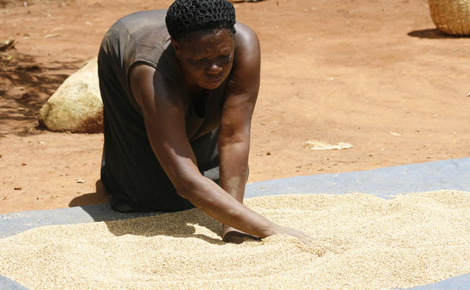 |
|
Alice Achieng’ at her home in Pap Nyadiel, Alego, Siaya County. She is among the farmers who were contracted by EABL but have been forced to go back to mixed farming after Treasury introduced 50 per cent tax on Senator Keg. [PHOTO: PHILLIP ORWA/STANDARD] |
Thousands of sorghum farmers are staring at losses amounting to billions of shillings due to lack of market and storage facilities.
The more than 25,000 farmers could lose up to Sh3.4 billion by end of this year. Stakeholders have raised alarm over the huge stockpiles of sorghum stored in warehouses and farms that even the middlemen previously accused of exploiting farmers by offering ridiculously low prices, have been unable to exhaust.
Anthony Kioko, CEO of Cereal Growers Association (CGA) says the farmers are stuck with thousands of tonnes of sorghum harvested in the past few months due to lack of market. “The total investment by all players including the Government, easily totals more than Sh10 billion, with estimated farmer losses standing at close to Sh3.4 billion,” said Kioko.
Most of the affected farmers are in arid and semi-arid parts of the country and ventured into sorghum farming following a massive campaign by the government to get residents to grow the drought resistant gadam sorghum to boost food security.
Before the State-led campaign, lack of ready market for the crop had seen sorghum production in Kenya drop from 220 metric tonnes per year in 1980 to 130 metric tonnes in 2009, according to data by United States Department of Agriculture.
Affected areas include Mwingi, Kitui, Tharaka Nithi, Makueni and Homa-Bay county. The rush to produce sorghum caught on in these areas after East African Breweries Limited (EABL) started to contract farmers to produce more sorghum for the manufacture of low-end beer, Senator.
Industry players now say the sorghum value chain is faced with threats compounded by the imposition of a 50 per cent excise duty on key sorghum-based beer following implementation of the Finance Act 2013.
So will the brewer buy the excess sorghum being held by farmers? “East African Maltings Limited (EAML) bought the sorghum it had contracted and skipped the October planting season to manage the low demand. We will continue purchasing sorghum as dictated by the demand,” said Lawrence Maina, General Manager, of the EABL subsidiary.
The tax led to increases of beer prices, which has now taken Senator beyond the reach of the poor people for whom it was being manufactured. Industry players say demand will stay flat for as long as the tax remains.
Rose Mutuku, MD Smart Logistics, which buys the crop from farmers says she started the sorghum business with the intention of supporting farmers from arid and semi arid regions.
“I started with 600 sorghum farmers in 2009/2010 and so far I have contracted over 5,000 farmers. My target was 60,000 farmers by 2015. Now I do not know what to do with the 50 tonnes (50,000 kilos) of sorghum in the store as EABL is no longer buying,” she says, adding that EABL was buying a kilogramme of sorghum at Sh33 while she bought from farmers at Sh27.
Kill the crop
This means that beyond the huge losses, over 25,000 smallholder farmers may not have their contracts renewed to supply the country’s largest buyer, with sorghum. Top industry players who met last month blamed the situation on policy changes effected by the government on the agricultural sector.
The forum, which was led by farmers through the CGA, comprised the Alliance for a Green Revolution in Africa (AGRA), the Eastern Africa Grain Council (EAGC) and the European Cooperative for Rural Development (EUCORD) said the sorghum sector was facing imminent collapse. Now, sorghum farmers want the government to immediately reverse the new tax regime on beer made from sorghum saying it will kill the crop and impoverish them.
Through their lobby, the Kenya National Farmers Federation (Kenaff), farmers say the 50 per cent tax rise has triggered an increase in consumer prices of unmalted beer which conversely decreased sorghum demand in the market. The effect is that that brewers and their suppliers are not buying sorghum from the farmers putting their livelihoods at great risk, said Kenaff CEO Dr John Mutunga.
Stay informed. Subscribe to our newsletter
“The collapse of the (sorghum) value chain has caused misery to not only the beer manufacturer and its agents but most importantly, to the thousands of small holder farmers spread across the country who were dependent on sorghum production and marketing. The tax regime also cost the government over Sh1 billion in tax revenue,’’ said Dr Mutunga.
 The Standard Group Plc is a
multi-media organization with investments in media platforms spanning newspaper
print operations, television, radio broadcasting, digital and online services. The
Standard Group is recognized as a leading multi-media house in Kenya with a key
influence in matters of national and international interest.
The Standard Group Plc is a
multi-media organization with investments in media platforms spanning newspaper
print operations, television, radio broadcasting, digital and online services. The
Standard Group is recognized as a leading multi-media house in Kenya with a key
influence in matters of national and international interest.
 The Standard Group Plc is a
multi-media organization with investments in media platforms spanning newspaper
print operations, television, radio broadcasting, digital and online services. The
Standard Group is recognized as a leading multi-media house in Kenya with a key
influence in matters of national and international interest.
The Standard Group Plc is a
multi-media organization with investments in media platforms spanning newspaper
print operations, television, radio broadcasting, digital and online services. The
Standard Group is recognized as a leading multi-media house in Kenya with a key
influence in matters of national and international interest.







